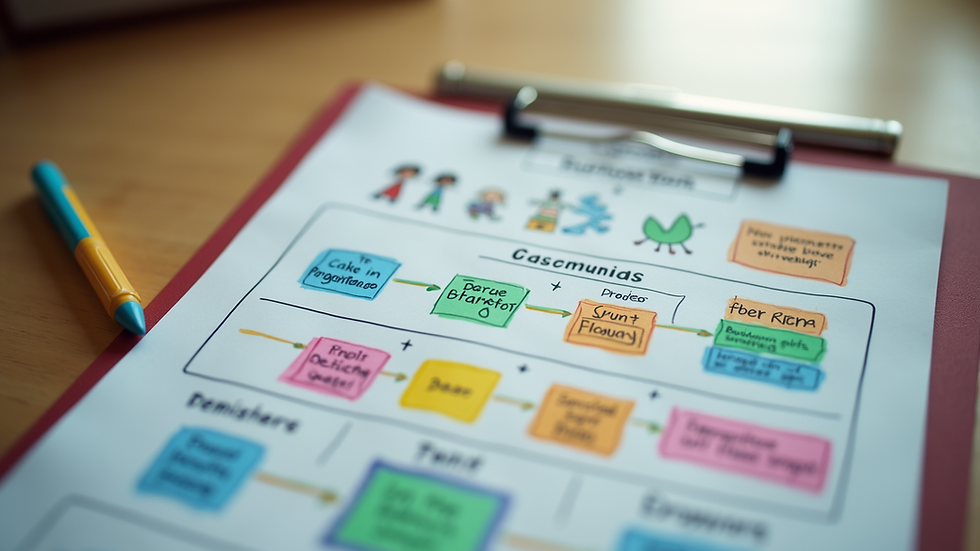Importance of Early Intervention for Childhood Disabilities
- Sarah Eis
- May 16
- 3 min read

Parenthood is a remarkable journey filled with hopes, dreams, and aspirations for our children. As parents, we strive to provide our little ones with the best possible start in life. However, when faced with the reality of childhood disabilities, it can be overwhelming and challenging to navigate through the uncertainties. That's where the importance of early intervention shines bright. In this blog post, we will delve into the significance of early intervention for childhood disabilities, understanding its benefits, exploring available resources, and equipping parents with the knowledge to support their child's development.
Understanding Early Intervention
Early intervention refers to the support and services provided to children with disabilities or developmental delays from birth to their entry into formal schooling. It aims to address challenges early on, maximize their potential, and foster overall development in various domains, such as physical, cognitive, communication, social, and emotional.
Identification and Assessment
The first step in early intervention is recognizing the signs of potential disabilities or developmental delays. Parents play a crucial role as observers and advocates for their children. Trust your instincts and consult with healthcare professionals if you notice any atypical behaviors or milestones lagging behind. Assessments by specialists, such as pediatricians, psychologists, or therapists, help diagnose disabilities and determine appropriate interventions.
Benefits of Early Intervention
Optimal Brain Development: During the early years, the brain undergoes rapid growth and development. Early intervention capitalizes on this plasticity, utilizing evidence-based techniques to promote positive brain changes and enhance neural connections. By stimulating and supporting the brain's development, early intervention lays the foundation for improved learning, cognition, and future success.
Improved Outcomes and Functioning: Early intervention can significantly impact a child's overall functioning and reduce the severity of disabilities. It enhances language and communication skills, motor development, social interactions, and daily living activities. Interventions, such as physical therapy, occupational therapy, and speech therapy, focus on specific areas of concern, helping children overcome limitations and reach their full potential.

Social and Emotional Well-being: Early intervention programs foster a supportive and inclusive environment, enabling children to develop vital social and emotional skills. Through group activities and therapies, children learn to interact with peers, regulate emotions, build self-esteem, and develop resilience. These skills lay the groundwork for healthy relationships, successful integration into school settings, and lifelong emotional well-being.
Empowering Parents
Early intervention isn't just about the child; it is also a partnership between parents and professionals. Intervention programs provide parents with the knowledge, skills, and strategies needed to support their child's development effectively. Parental involvement not only facilitates the child's progress but also empowers parents to become advocates, ensuring their child receives appropriate services and accommodations throughout their journey.
Available Resources and Services
Early Childhood Intervention (ECI) Programs: ECI programs are comprehensive services designed to support families with children from birth to three years of age who have disabilities or developmental delays. These programs offer a range of therapies, including speech therapy, physical therapy, occupational therapy, and specialized education. They also provide resources, support groups, and parental training to equip families with the tools they need to navigate their child's unique challenges.
Supportive Educational Settings: Once a child reaches the age of three, they may transition from ECI programs to educational settings. Public schools often provide special education services tailored to meet the unique needs of children with disabilities. Individualized Education Programs (IEPs) outline specific goals, accommodations, and related services required to support the child's learning and development.
Online Communities and Support Groups: In this digital age, online communities and support groups play a significant role in connecting parents, sharing experiences, and providing emotional support. Joining these communities can help parents feel less isolated, gain insights from others facing similar challenges, and learn about valuable resources and strategies.
Conclusion
Early intervention is a powerful tool that can transform the lives of children with disabilities and their families. By identifying and addressing developmental delays or disabilities at the earliest stage possible, parents can access specialized services and support that can unlock their child's potential, improve their overall functioning, and enhance their quality of life. Remember, as parents, you are not alone in this journey. Reach out to healthcare professionals, intervention programs, and online communities to find the guidance and support you need. Together, we can create a world where every child has an equal opportunity to thrive and succeed, regardless of their abilities.




Comments